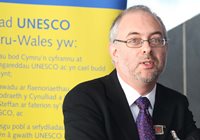Ebola Crisis: Aberystwyth academics back World Health Organisation

Professor Colin McInnes, Director of the Centre for Health and International Relations
09 January 2015
Three academic members of staff at Aberystwyth University’s Department of International Politics have called for greater funding for the World Health Organisation in light of the continuing Ebola outbreak in west Africa.
Professor Colin McInnes, Director of the Centre for Health and International Relations, Dr Christian Enemark, Reader in Global Health and International Politics, and PhD student Clare Wenham are co-signatories to an open letter on the Ebola crisis published in the The Lancet on Saturday 10 January.
Signed by 95 members of the global health scholarly community, the letter calls on all WHO Member States to recommit themselves to strengthening global outbreak alert and response by sustainably investing in the WHO, its departments, and personnel.
They argue that funders should resist the temptation to use the extreme case of Ebola to justify further erosion of the WHO and diversion of voluntary contributions to other institutions despite the WHO secretariat admitting that mistakes were made during its initial response to the 2014 Ebola outbreak.
They also argue for maintaining the WHO’s Global Outbreak Alert and Response Network rather than pursuing a proposal to establish new “first responder” UN agency.
The letter concludes; “The WHO can provide global health leadership that is technically informed and representative. The organisation remains a fundamental element of global health governance, and provides an indispensable service as the lead technical agency in global health. While mistakes have been made, rather than engage in the further dismantling of the WHO we call on all Member States and the international community to give the organisation the resources it needs to serve its members and the populations they represent.”
In a separate comment on the Ebola crisis, Professor McInnes argues that to prevent similar situations in the future, people need to understand not simply how the Ebola outbreak occurred, but why it spread and developed into the crisis we see today.
“At the end of last year, the World Health Organisation reported new figures of 7,905 deaths and 20,206 infections from the current Ebola crisis. Almost all of these were in the three West African states of Guinea, Liberia and Sierra Leone. Perhaps the most common explanation for this concerns the lack of resources for public health in the region. In particular, the three countries most affected by Ebola are also some of the poorest on the planet with predictably weak public health systems.”
Despite unprecedented sums of money being spent on health in Africa since the beginning of the new millennium, including international initiatives such as the Global Fund to Fight AIDS, Tuberculosis and Malaria, Professor McInnes argues that focusing on high profile diseases such as HIV has meant other diseases have been neglected.
“More money has led to an increase in the number of agencies and initiatives, leading to duplication of effort, confused approaches and competing agendas, and a tendency to focus on emergency response rather than preventative measures to building up public health infrastructure. Moreover the allure of pharmacological solutions – new drugs or vaccines – too often takes precedence over the development of basic public health initiatives”, he said.
Professor McInnes also argues that the Ebola crisis reveals another disconcerting trend – our fascination with exotic diseases and outbreaks (especially when there is a risk, however slight, that they might arrive in developed countries) over more mundane endemic conditions.
“That 7,905 people have died of Ebola is tragic, but during the same period the WHO estimates that 750,000 children under five died from diarrheal disease, easily preventable through safe drinking water, improved sanitation and soap for hand washing.
“But there is no emergency military deployment to help here, no international outcry, no disaster relief fund, no celebrity campaigner and no ribbon for my jacket lapel. And this year, as the Ebola crisis hopefully wanes, another 750,000 children will die from exactly the same disease. So what is the real crisis?”
AU0115



